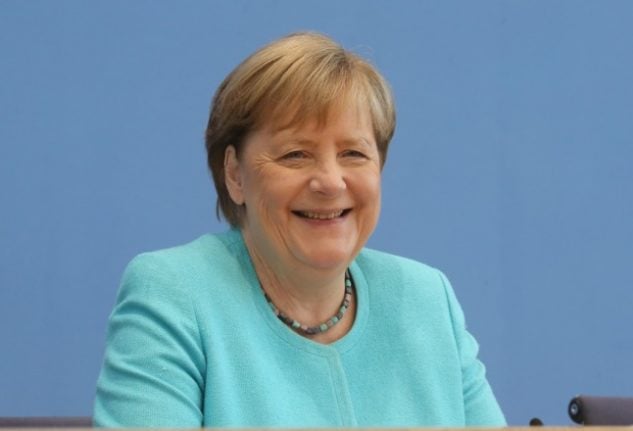Punctual and prepared for whatever questions came her way: Chancellor Angela Merkel was ready for the annual summer press conference slightly ahead of the official start time on Thursday at 11am.
When the conference organiser asked which journalists had questions, almost every hand shot up. Merkel smiled – the interest in her is – as always – huge.
It has become a tradition for Merkel to attend the Federal Press Conference (Bundespressekonferenz) before the start of the political summer break, or at the end of it, and take questions from journalists.
Another “end of an era” Merkel moment: every year since she became chancellor, Angela Merkel came to the federal press centre -where we work as political correspondents- to answer reporters’ questions. Today was the last time. (Photo via @AlemaniaDiplo) pic.twitter.com/TVGrEAiyE0
— Thomas Sparrow (@Thomas_Sparrow) July 22, 2021
Thursday marked the last time before Merkel steps down at the September 26th election. Merkel used the appearance to urge people to get vaccinated against Covid – and to take stock of her 16 years in office.
‘Get vaccinated’
The choice of topics for her opening statement made it clear what’s on Merkel’s mind: the flood disaster and the Covid pandemic.
Merkel, who visited the flooded areas earlier this week, spoke of “terrible devastation” and said it would take a long time to repair the damage.
Her tone becomes more worried on the topic of Covid. New infections have again taken on a “worrying dynamic,” she says. Merkel passionately promotes vaccination.
“Vaccination not only protects you, but also someone near you, someone you love,” she said.
READ ALSO:
The 90 minute question-and-answer session that followed became a tour d’horizon through current national and international politics with issues such as climate protection, refugee policy, Nord Stream 2, as well as female leadership discussed.
In what could be her last big presser, Merkel articulates one of her greatest concerns: the social media boosted mixing of feelings and facts is threatening the achievements of Enlightenment. "Feelings are feelings, and facts are facts" – a message to both the Left & the Right pic.twitter.com/4FQ6JLzw7z
— Bojan Pancevski (@bopanc) July 22, 2021
Germany ‘could and should do better’
Merkel appears relaxed, answered routinely and occasionally let her sense of humour shine through.
The chancellor presents herself as a head of government who, after 16 years in office, knows what she has succeeded in doing and what she has failed to do, or done inadequately.
Take climate protection: “I believe that I have devoted a great deal of energy to climate protection,” said Merkel, who served as Minister for the Environment under Helmut Kohl.
“And yet, I am sufficiently equipped with a scientific mind to see that the objective circumstances require that we cannot continue at this pace, but must speed up.”
Some of her answers could be seen as a mandate to whoever fills her shoes.
On the subject of digitisation, Merkel conceded that Germany “could and should be better”.
READ ALSO: Merkel demands faster climate action as German flood death toll rises
When it comes to the pandemic Merkel said the German government had done “a great deal of things right”.
“But in some areas, such as the protection of residents in old people’s homes, things did not go so well,” she said.
Merkel was asked how she would describe the state of the country at the end of her term.
“We are a strong country,’ said Merkel. That, she says, is evident in how Germany has handled the pandemic. “But we really have work to do in some places to maintain the high standards we have. And the world is evolving at an insanely dynamic pace.”
A Merkel sentence if there ever was one, on feminism and female leadership: "Women tend to long for efficiency." „Frauen haben tendenziell eine Sehnsucht nach Effizienz.“ pic.twitter.com/ylJG7XWKjp
— Deborah Cole (@doberah) July 22, 2021
On Merkel’s own plans after politics, the scientist and politician was keeping a low profile. She is still in office and facing the every day challenges of running the country, she said. “And that will continue until the last day of my term… That’s why there’s little time and space to deal with the time after now.”
But when she does retire, Merkel said she’ll “be able to do something with the time then”.
Like in all engagements, Merkel is graceful – she tells the journalists it was a “pleasure” to attend the event. “I never know what you’re going to ask,” she said.
At the end of the Q&A, the conference organiser wondered aloud if the Chancellor will attend another question and answer before she steps down.
“No promises,” joked Merkel, adding once more: “It was a pleasure.”
READ ALSO: Life after Merkel: Is Germany ready to think about what’s next?




 Please whitelist us to continue reading.
Please whitelist us to continue reading.
Member comments